The Resource Management Program within the Land and Materials Administration of the Maryland Department of the Environment regulates several activities to ensure the protection of public health and the environment. These include, but are not limited to:
Regulating the discharges from animal feeding operations (AFO);
Responsible for the implementation of Maryland’s waste diversion programs, including recycling, source reduction, and the review and evaluation of county solid waste and recycling management plans;
Regulating composting facilities;
Regulating the utilization of sewage sludge (Biosolids);
Regulating the clean-up, storage, collection, transferring, hauling, recycling, and processing of scrap tires.
Announcements
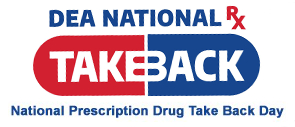
The National Prescription Drug Take Back Day aims to provide a
safe, convenient, and responsible means of disposing of prescription
drugs, while also educating the general public about the potential for abuse of medications. The web page also give the ability to search for year round pharmaceutical disposal locations.
The next take back day is on April 27, 2024 from 10 AM to 2 PM
Animal Feeding Operations (AFO)
An "Animal Feeding Operation (AFO)" means a feedlot or facility where: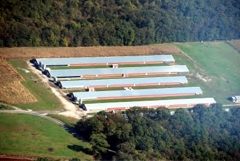
- Non-aquatic animals are confined, fed, and maintained for at least 45 days in any 12-month period; and
- Crops, vegetation, forage growth, or post-harvest residues are not sustained in the normal growing season over any portion of the lot or facility.
Regulations for AFOs became effective January 12, 2009. AFO regulations and the General Discharge Permit (GD Permit) are designed to control nutrients from Maryland’s largest agricultural animal operations and are a significant step forward in protecting the Chesapeake Bay, local waterways, and our drinking water.
For additional information or questions, go to the AFO web page or contact Darren Alles by email or phone at 410-537-3314.
Waste Diversion
The Maryland Department of the Environment (MDE) promotes and encourages waste diversion across the State of Maryland. Waste diversion combines both recycling and source reduction activities.
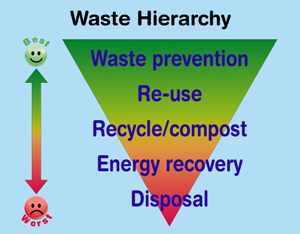
MDE works toward Maryland's waste diversion goals by partnering with Maryland's jurisdictions and the public and private sectors to develop markets for recyclable materials and by working with other State agencies to increase the volume of materials diverted from landfills.
For additional information or questions, go to the Waste Diversion web page or contact David Mrgich by email or phone at 410-537-3314.
-
Compostable materials such as food scraps and
yard trimmings make up nearly 30% of all municipal solid waste
generated in the U.S. Instead of disposing of this material in
landfills and incinerators, composting uses organic material to create a
valuable product with environmental and economic benefits.
Recycling of some organic materials, such as yard trimmings and manure,
is widespread in Maryland. One area of growing interest is food scraps
diversion. Though only an estimated 15.5% of food scraps was recycled
in Maryland in 2019, much of the remaining material could be prevented,
used to feed humans or animals, or composted.
For additional information or questions, go to the Organics Diversion and Composting web page or contact Tariq Masood by email or phone at 410-537-3314.
- Solid Waste Management – Organics Recycling and Waste Division – Food Residuals - In 2021, the Maryland General Assembly passed House
Bill 264 to address food residuals going to landfills or incinerators.
Food residuals are any material derived from the processing or
discarding of food, including pre- and post-consumer vegetables, fruits,
grains, dairy products, and meats.
HB264 requires that large
food residual generators (2 tons/week or more, 1 ton/week as of 1/1/24),
and are located within 30 miles of an organics recycling facility
willing to take and process all of the generator's food residuals, to
divert those food residuals from final disposal in a landfill or
incinerator. Diversion includes donation for people, donation for animal
feed, and/or sending food residuals to a composter or anaerobic
digester.
For more information, please visit MDE's Solid Waste Management – Organic Recycling and Waste Diversion – Food Residuals webpage, where there are links to the regulations and forms, or contact Tim Kerr or Shannon McDonald at MDE's Waste Diversion Division.
Recycling Market Development
In 2021, the Maryland General Assembly passed House Bill 164 to promote increased recycling and develop recycling-related businesses in Maryland. Many products that technically can be recycled often are not due to a lack of end-markets for the material. The law Requires the Office of Recycling in the Department of the Environment to promote the development of markets for recycled materials and recycled products in the State. It also requires the Office to evaluate the availability of recycling markets and identify businesses in the State that use recycled materials.
For more information, please visit MDE's Recycling Market Development webpage or contact Tim Kerr or Shannon McDonald at MDE's Waste Diversion Division.
Sewage Sludge Utilization (SSU)
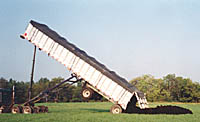 Sewage sludge (also known as biosolids) is not sewage, but rather is one of the final products of treated sewage at a sewage (wastewater) treatment plant. Sewage sludge is the fine particulate matter remaining after treatment which breaks down organic matter and destroys disease organisms in sewage. The application of sewage sludge to land returns essential nutrients to the soil, adds organic matter, and can improve the tillability and moisture retention capability of the soil. A SSU Permit is required for any person who collects, incinerates, stores, treats, applies to land, transports or disposes of sewage sludge or septage in Maryland. (factsheet)
Sewage sludge (also known as biosolids) is not sewage, but rather is one of the final products of treated sewage at a sewage (wastewater) treatment plant. Sewage sludge is the fine particulate matter remaining after treatment which breaks down organic matter and destroys disease organisms in sewage. The application of sewage sludge to land returns essential nutrients to the soil, adds organic matter, and can improve the tillability and moisture retention capability of the soil. A SSU Permit is required for any person who collects, incinerates, stores, treats, applies to land, transports or disposes of sewage sludge or septage in Maryland. (factsheet)
For additional information or questions, go to the Sewage Sludge Utilization Permit Application web page or contact Mev Jerry Egbegbadia or phone at 410-537-3314.
Scrap Tires
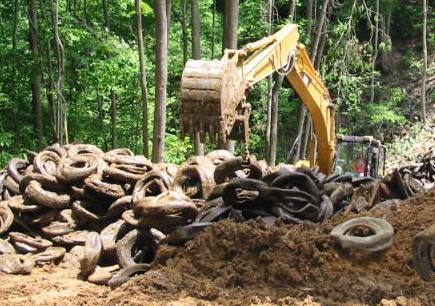 Scrap tires, because of their size, shape and associated environmental hazards, present both difficult and costly disposal and recycling challenges for the entities responsible for overseeing their management. MDE's Scrap Tire Program is dedicated to ensuring the cleanup of illegal scrap tire stockpiles and to managing the collection, transportation, recycling, and processing of the scrap tires generated in Maryland.
Scrap tires, because of their size, shape and associated environmental hazards, present both difficult and costly disposal and recycling challenges for the entities responsible for overseeing their management. MDE's Scrap Tire Program is dedicated to ensuring the cleanup of illegal scrap tire stockpiles and to managing the collection, transportation, recycling, and processing of the scrap tires generated in Maryland.
For additional information or questions, go to Maryland's Scrap Tire Program web page or contact Abby Pascual by email or phone at 410-537-3314.
Contact Information
For additional information or questions email the Resource Management Program or phone at 410-537-3314.